|
TRANSLATE THIS ARTICLE
Integral World: Exploring Theories of Everything
An independent forum for a critical discussion of the integral philosophy of Ken Wilber
 Adrian Ivakhiv is a Professor of Environmental Thought and Culture at the University of Vermont, with a joint appointment in the Environmental Program and the Rubenstein School of Environment & Natural Resources. He has conducted research in Ukraine since 1989, when as a Canada-USSR Scholar he studied the impacts of the Chernobyl nuclear accident on cultural and environmental politics in Ukraine. He can be found on Facebook and Twitter. Adrian Ivakhiv is a Professor of Environmental Thought and Culture at the University of Vermont, with a joint appointment in the Environmental Program and the Rubenstein School of Environment & Natural Resources. He has conducted research in Ukraine since 1989, when as a Canada-USSR Scholar he studied the impacts of the Chernobyl nuclear accident on cultural and environmental politics in Ukraine. He can be found on Facebook and Twitter.
The Invasion of UkraineWhat It Means For Us and How We Can HelpAdrian J. Ivakhiv
The Invasion of Ukraine: What It Means For Us and How We Can Help
Ukraine is a struggling democracy trying to figure out how to deal with a very difficult economic situation exacerbated by war on its eastern border.
[March 7, 2022, Intro part of the video skipped.] I study the cultural dimensions of environmental issues, which means that I study the way people perceive, make sense of, and communicate about environmental issues, including conflicts over landscape, over particular places, and so on. Sometimes those conflicts involve nationality, a sense of national identity, sometimes religious identity or other forms of cultural identity. I've been doing this for years in different places, but one place that I come back to pretty regularly is Ukraine. That's in part because I studied there as a graduate student for a year in 1989-90 as a Canada-USSR Scholar at the tail end of the Soviet Union looking at how the Chernobyl accident had affected people's identity and people's willingness to bring about change, including the kind of environmental and social change that led to what became the national independence movement in Ukraine.  Adrian Ivakhiv The other reason why I've been connected to Ukraine is because I am Ukrainian Canadian. I grew up in Toronto. My parents were both refugees from World War II. Toronto has a large Ukrainian community, so I grew up speaking Ukrainian and I've visited Ukraine maybe a dozen times or so for shorter or longer periods. I have family there, and many friends and colleagues, and I've been trying to keep in touch with them to follow along to see what's happening on the ground with many of them over the weeks since the invasion began. So what I'm going to do today is partly based in that research interest which takes a lot from the work of other people, other experts on Ukraine whose work I follow, whom I know and try to keep up to date with, and partly my own research as well as personal connections that I have. What I'll do is to cover five topics and five slides:
1. WHAT DOES PUTIN WANT?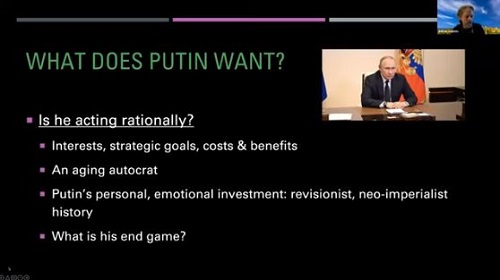
The Invasion of Ukraine, Adrian Ivakhiv, slide 1
One of the big questions around all of this has been: what is this man who happens to have the largest nuclear arsenal on the planet at his fingertips, what is he thinking? Russia's nuclear arsenal is larger than the US's. The US still has the largest military (though in terms of numbers of people in the military China's is larger). Most analysts have been trying to understand Putin's logic as if he were a rational actor who's acting on the basis of interests, strategic goals, and the calculation of costs and benefits, and in the past this has more or less worked. He's had a long history as a politician going back to 1999, that has included various power grabs including wars and military incursions in Chechnya, which helped him rise to the top of the Russian political establishment, and in Georgia in 2008, in Syria, and of course in Crimea and now all of Ukraine. Understanding his strategic thinking has been complicated and in this case I would argue does not work if we think of him as a rational actor. There are two main reasons for that. One is that as an aging autocrat he, like all people who've got a lot of power and who've figured out how to eliminate political challengers, he's surrounded himself by “yes men,” by people who go along with his vision, and therefore he's become increasingly insulated against the sort of reality checks and balances that would otherwise keep him tethered into a kind of international “consensus reality.” Not all analysts say this, but I think the signs are there that, and it's possible that, the COVID pandemic has made him more insulated as well; at least there's speculation about that. The other reason is that Putin is deeply, personally and emotionally invested in a kind of vision of the future of Russia that is based on a revisionist and neo-imperial understanding of Russia and Russia's greatness. And this has a huge implication for Ukraine. He's written about this, he wrote a 5000 word essay last summer, published last summer ["On the Historical Unity of Russians and Ukrainians", FV]. Other people close to him, Dmitry Medvedev and others, have written almost as a kind of alter ego of Putin about this. There was a piece that was leaked, that was published in some Russian online versions of newspapers last week, that had assumed that the invasion was victorious, and they took it off and they realized their mistake but it was a piece by Pyotr Akopov articulating the same vision of a greater Russia that is re-establishing itself after the calamities of its recent history. So Putin considers the collapse of the Soviet Union to have been a catastrophe and one that Russia has not yet recovered from. He considers Ukrainians, at least in what he's been saying and writing, to be not a real nation and to be effectively no different than Russians, except a kind of 'little brother.' The term 'Little Russian,' or Maloros, is the term that was used in the Russian empire to refer to Ukrainians. So Ukraine is a kind of part of the Slavic, the East Slavic greater Russian family, but they have deviated, they've been misled by the West, by a kind of decadent and untrustworthy Western world, Europe. (A term that sometimes actually gets used in Russia is the term "Gayropa", which refers to the Europe of LGBTQ rights, women's rights and other threats to white Christian European civilization.) So there's a kind of deeply conservative and anti-modern strain in Russian thinking among some of the people who've been influential on Putin in recent years that comes out in this idea that Ukraine needs to be brought back, it's been severed from the homeland and infected by the virus of nationalism, and needs to be purified—if you remember his reasoning when Putin announced the start of this “military exercise” Ukraine, in his mind, needs to be “denazified,” and i'll come back to that shortly. So in other words Putin's thinking doesn't really allow us to see him any longer as a rational actor. It's more troubling than that, and that makes it more important for us to pay attention to what's happening in Ukraine right now. 2. WHAT ARE RUSSIANS THINKING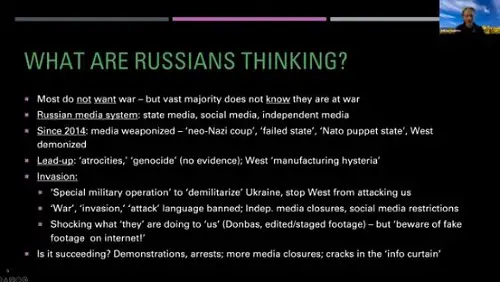
The Invasion of Ukraine, Adrian Ivakhiv, slide 2
What are Russians thinking with all of this? Most Russians do not want war. Most Russians, certainly the majority, do not know that Russia is at war with Ukraine, and that's part of the problem... I'll talk a little bit about the Russian media system. To simplify, we can divide that between state media, social media, and independent media. State media is controlled by the Russian state, funded by it, and so on. Independent media is at this point fairly small, there are various forms of it, but with varying degrees of accessibility to the broader public. Mostly they're online and since the start of the offensive they've been under a lot of pressure with independent media channels being closed down and forced out of the country and that sort of thing. Social media is a kind of complicating factor. More than half of all Russian citizens check the internet at least once a day and use social media at least daily. The most popular websites have been Youtube, VKontakte (which is sort of like a Russian version of Facebook, but is its own thing and it's pretty restrictive in terms of political expression), WhatsApp, Instagram, some other Russian social media sites, as well as Facebook, Tiktok, Telegram and others. I'll come back to them in a moment. As far as state media goes, which is still where most Russians get their information, it's become very tightly controlled and particularly on this international issue and controlled so as to be on message, with the message being that Russia is not at war. The words "war", "invasion" and "attack" aren't being allowed in the mass media. In Russia it's called a "special military operation" with the goal of demilitarizing Ukraine. To really understand this, we have to go back eight years. As you all know, eight years ago Ukrainians by the hundreds of thousands or millions mobilized in opposition to a president whose name was Viktor Yanukovych. He had promised to make a trade deal with the European Union, and at the last moment he backtracked and made a deal instead with Russia, with Putin, and many people were shocked by that, in particular young people who had their hopes up about EU membership. Behind this is a complicated story, but the point is that in Russian media this Maidan revolution, which overthrew this president who was considered a kind of a dictator, authoritarian and illegitimate, at that point particularly after the shooting of dozens of people in the streets of Kiev. So Yanukovych fled the country. Russian media portrayed that as a “neo-Nazi coup” and it's been continuing to portray it that way. It's been portraying Ukraine as a failed state run by thugs in compliance with western powers. Putin last week called them "drug addicts" and "nazis", and called Ukraine a NATO puppet state, and this has been connected to that kind of demonization of the West of Europe and of the US that's been ramping up in Russia over this entire period. Contrary evidence isn't really admissible to any of these claims. But just briefly: Ukraine is a multi-party democracy with a Jewish president, until recently a Jewish prime minister. It was the second country in the world with a Jewish president and prime minister at the same time, the first being Israel. The far right movements that did play some role during the Maidan revolution have never had much public support as far as voting goes, something like one and a half percent support. Russian media depicted the first election as a far-right takeover and they had programming all ready to go and in fact released it briefly, because they had assumed that the leader of a small group called Right Sector, an ultra-conservative group, would become president. He didn't—he got 1.5% of the vote. But somehow they thought that they would keep playing this up. It's a complicated situation, but as a multi-party democracy Ukraine's been going back and forth between various political parties. Zelensky's victory was 73% voting in favor of him, his party is a brand new party that was formed around him with many political neophytes who had not been in politics. So it's sort of a struggling democracy trying to figure out how to deal with the very difficult economic situation exacerbated by a war on its eastern border. Is it a failed state? Not if you compare it with a lot of other states. Politically it's not failed, economically it's been struggling. Is it a NATO puppet state? That's an important point to consider, because one of the arguments has always been that NATO expanded practically to the borders of Russia and that this has humiliated Russia, which raises the question of whose humiliation counts and whose doesn't in the world, but let's leave that aside. NATO did expand, it expanded because a lot of post-Soviet and East European countries wanted the protection that they saw NATO as offering. Right now we're seeing why, and we're seeing why it didn't expand quickly enough for Ukraine. But again that's a long argument, there are different perspectives on it and I'd be happy to take it up in the Q&A. So what are Russians thinking and is this kind of state control of media succeeding? They've been clamping down on independent media particularly in the last week or so, so it's really not getting out there to the majority of Russians as far as I know, but there still is stuff on the internet and I believe Facebook has been taken down in Russia, Google and other western sources have been slowed down, Twitter has been made more difficult to access, and so on. There have been demonstrations of thousands of people in cities around the country with arrests, tens of thousands of people demonstrating, thousands of arrests, supposedly what's being considered is a state of martial law, but it hasn't been announced and we'll see if it will be, but there are cracks in what we might consider the information curtain and I want to come back to that in a few minutes. So it is possible to get some news especially if people in Russia have contact with Westerners, but one of the main tropes in current state media coverage is that there's a lot of fake footage on the internet: "Beware of it, don't believe what you see on the internet, because western countries, NATO and Ukrainians are trying to bombard us with fake news"... Now that's a kind of story we've become familiar with in this country and I'm going to come back to that connection too. Another media trope has been that "It's shocking what they, presumably Ukrainians, are doing to us" ("us" being the Russians in eastern Ukraine, in the Donbass region). They're Russians now because Russia offered them Russian citizenship. The whole question of Russian speakers and all of that is very complicated, but it should suffice to say that most Ukrainians are bilingual and speak Russian or understand Russian, and to speak of persecution of Russian speech or language doesn't really make much sense. 3. WHAT ARE UKRAINIANS THINKING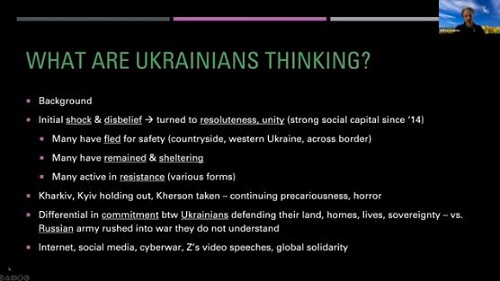
The Invasion of Ukraine, Adrian Ivakhiv, slide 3
First a little bit of background. Ukraine as we know is its own state, has been since 1991 independent of the Soviet Union. Before that it was a republic within the USSR. Its history goes back a long way. It had statehood of its own back around 1917, 1918, off and on in the midst of the war, the revolution, the Soviet Red Army was sort of occupied with fighting all around Russia and parts of Ukraine, the White Army, the Ukrainian National Republic or the Ukrainian People's Republic proclaimed independence, established itself for periods at a time between 1918 and 1921 or 22, with a capital in Kiev. But that eventually got closed off by the triumph of the Soviet Army, and from 1922 on Ukraine became the Ukrainian Soviet Republic within the USSR. Independence was voted on in a referendum in 1991, in which about 92-93% of Ukrainians voted in favor of it and this was entirely across the country. The last 30 years have been difficult economically, very difficult, and characterized by some of the same problems we've seen in Russia and some other post-Soviet countries where there was a rapid selling off of national industries to those who were best positioned at the time, who were sort of members of the kind of the young Communist elite who became what we now call "oligarchs", became ultra-rich billionaires and own many important industries. Unlike what happened in Russia where Putin centralized control with an elite of oligarchs, in Ukraine it's never been quite that centralized. There have been groups or “clans” of oligarchs acting as rivals to each other, which has allowed for some sort of pluralism and to a certain extent they have funded political parties, media and so on, but not exclusively. There's been plenty of other opportunities for getting news and for organizing political parties as we've seen with the last few elections. So Ukraine has been a country that's also been veering a little bit to the West, but then going back to the East, kind of a back and forth in 2004, the Orange Revolution protested the clearly falsified election of president Yanukovych, whose name I mentioned earlier. The Orange Revolution brought in the government of Viktor Yushchenko. Unfortunately there was infighting and things didn't turn out as well as people wanted and by 2010 Yanukovych, the same guy, got elected again thanks to Western advisers led by Paul Manafort. Now if you've been following Donald Trump you know who Paul Manafort is, so that's where he comes from. Eventually Yanukovych gets thrown off in the Maidan revolution and now we have this state of war that's been defining the last eight years. But also the last eight years have seen a strengthening of social capital around the country, with real efforts to build social resilience. In part this has been supported by Western NGO's and in part it's just Ukrainians trying to figure out how to live. There have been some decentralization laws that have helped to give people a better sense of their own agency, their own political and social agency, and all of that is visible in the resistance to this invasion. So ten days ago, shock and disbelief. Most Ukrainians had been hearing these predictions, but they didn't think that Russian armies would invade the entire country. They thought, okay Putin might want to take a bigger chunk of eastern Ukraine or something like that, but why would he invade us? It couldn't possibly, they couldn't possibly take over, and it looks like they may be right, so shock and disbelief, but it's turned for many Ukrainians into a kind of resoluteness, a sense of unity and resistance. Many have been fleeing for safety to the countryside, to western Ukraine, across the border, as we've seen now, over a million. [By May it has become more than five million, AI.] Many have remained and are sheltering in different places, many are active in resistance in various forms, non-violent or taking up weapons when needed. It's very surprising to a lot of people, including to me, that Kharkiv and Kiev, the two largest cities, have held out. Only one major city has so far been essentially taken by the Russian military, that's Kherson in southern Ukraine. The bad part of that is that they can now start playing Russian state media on the television, beaming it out in in southern Ukraine which which has a tendency to render more confusion and so on. But the real difference between what people expected and what I believe Putin expected, which was rapid victory, and what's actually happened, comes from the difference in commitment between Ukrainians defending their land, their homes, their lives, their sovereignty, their hard gained sovereignty, for many of them, against a Russian army that's been rushed into a war that many of the Russian soldiers and conscripts themselves don't understand. They don't know why they're there. They didn't realize they would be invading this country, and they're ill-equipped because they weren't prepared for a long drawn-out thing. So the information that the Putin government was working with seems to have been flawed and that goes back to my comments about what Putin has been thinking.
Various complications, social media, cyber war, surprisingly again Ukrainians have been doing pretty well on the informational and cyber front. You might say they've mobilized a lot of activists including activists around the world. If you're familiar with Anonymous, the hackers network, they have joined against the Russian invasion. President Zelenskyi's video speeches have done a great job. The fact that he's there, that he's visible every day, even though Kiev has been bombarded, gives people a sense that not only is this country working together but the leadership is there to to lead it. And there's a great sense of global solidarity. 4. WHAT'S AT STAKE, WHY IMPORTANT?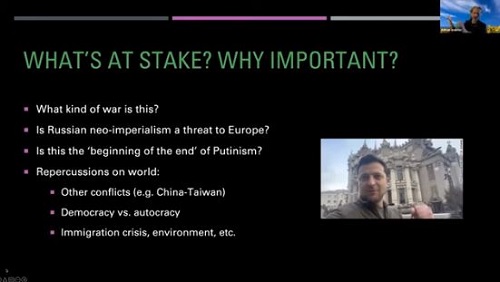
The Invasion of Ukraine, Adrian Ivakhiv, slide 4
So Ukraine's very existence as an independent sovereign democratic and more or less European state is a threat to Putin's autocratic neo-imperial vision of Russian power. All right, what's at stake and why is it important for us? First of all, the war in Ukraine is not a two-way conflict. Ukrainians, citizens and residents of Ukraine are victims of an unprovoked invasion. Russian efforts to blame Ukraine, NATO, the US and the West, they may be based on certain histories that again are complicated, but they are at this point strategies of war intended to sideline the victims and place Russian neo-imperial interests at the center of world attention. Putin wants to meet with Biden not with Zelensky. Zelensky is not important to him. In fact there have been, according to Ukrainian authorities, three assassination attempts, all of them foiled locally in Kyiv, assassination attempts on Zelensky's life. So Ukraine's very existence as an independent sovereign democratic and more or less European state is a threat to Putin's autocratic neo-imperial vision of Russian power and that's why the end game is about absolutely taking control of Ukraine, taking it over, destroying opposition, or... I don't know what the "or" is. It's very difficult to know what Putin would settle for. Now there are things that I think Zelensky is prepared to talk about, like military neutrality, which would work if it was supported by the West and by other important players around the world. You may know that Ukrainians gave away their nuclear arsenal in 1993-94 for the guarantee that their boundaries will not be violated. Russia signed on to that, the US and the UK signed on to it, it's called the Budapest Meorandum. Russia violated it in 2014 and not much happened, a few sanctions, selective sanctions, but nothing major. So why would Ukrainians trust that kind of agreement? I think that Zelensky is trying to involve Israel in negotiations in some mediation and China potentially and with those kinds of players, especially China on board and the West, maybe some kind of neutrality can be negotiated. But that's at this point still getting ahead of us.
So Ukraine's very existence as an independent sovereign democratic and more or less European state is a threat to Putin's autocratic neo-imperial vision of Russian power.
Second point is Russian neo-imperialism. Is it a threat to Europe, is it a threat to us? Even if Russia's military is not the strongest in the world, its nuclear arsenal is the largest and its informational and hybrid war techniques are well honed and powerful, and their goals as we've seen include weakening the liberal democratic world, the world of sovereign democratic states, that the US and West pretend at least to champion. And we've seen the results of that, of this hybrid and informational warfare in the domestic politics of our own country in the last five, six years and many other countries, including meddling in the Brexit vote and various other sorts of things, and propping up far-right political parties all across Europe: in Hungary, in France, in Italy. So this vision of a kind of rearranged world is not separate from us and it's not incidental to these other problems that we've been identifying in media—“fake news” and things like that. I would argue that they're part of a global struggle over the fate of democracy and that democracy is in fact at stake. It goes without saying that the US and other Western nations are not innocent historically in their relations with the rest of the world and that oligarchs are not just in Ukraine or in Russia, they're everywhere and their wealth corrupts politics everywhere. Democracy requires constant maintenance, vigilance and action and right now Ukraine is probably the most urgent battleground in this struggle between democratic institutions and democracy as a kind of way of life with all its challenges and difficulties and oligarchy, authoritarianism and the kind of militarism that we're seeing in Ukraine right now. 5. WHAT CAN YOU DO?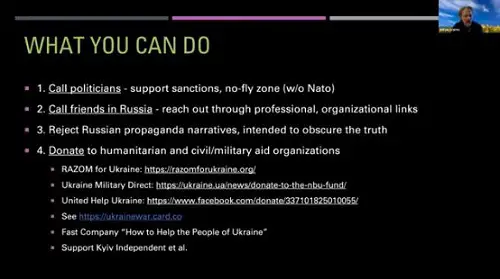
The Invasion of Ukraine, Adrian Ivakhiv, slide 5
Okay so just to wrap up: what can we do is, first, to call politicians, urge them to support sanctions, more than there's been, and I would argue urge them to actually support a no-fly zone. I realize that that seems a non-starter to many people, but there are ways of having a no-fly zone without direct NATO involvement and you can you know I'd be happy to share information about that. Second, call friends in Russia if you have any connections through professional organizational links, through family links, whatever. It's absolutely imperative that we be in touch with Russians on the ground when state media is not allowing discussion of the reality of the war. The only way that people can find out is if they hear it from enough places. Russian support and acquiescence is what allows their government to conduct this assault. Thirdly, reject Russian propaganda narratives, they're intended to obscure the truth. There's plenty of analysis on that and really I want to argue that media are absolutely important. We need to support our own media institutions to allow them to carry out the kind of work that is needed. I've been pretty impressed with even our major news networks, CNN and MSNBC and others, being on the ground in various parts of Ukraine. There's a lot more that can be done by our own media but we need to support the best of our media and the best of media that can actually have an impact in that part of the world. And finally, you can donate to humanitarian as well as civil and or military aid organizations and there's a few websites right there that I would recommend and various articles. [Q&A part of the video deleted from this transcript.] FURTHER VIEWINGMore depth and background can be found in another, more recent presentation by the author:
The Invasion of Ukraine as a Turning Point", UC Santa Barbara, April 5, 2022.
|